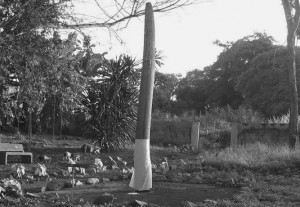
Oranyan was the last son of Oduduwa, whose disposition to war earned for him the rights to the throne of Ile Ife. His empire extended beyond present South West Nigeria further north, and to Dahomey and even some areas in Ghana. Oranyan was the second sovereign in Ile Ife, after Oduduwa and the first Alafin of Oyo. His obelisk, standing at 9 feet in Ile Ife has been a subject of academic research. Shortly after his ascension to the throne, Oranyan had ventured to go fight in the East, against people tradition assert were the Mohammedan adversaries of his father. On leaving the seat of power at Ile Ife, he had entrusted sacred items including the Idi, traditionally taken as the Koran but which is likely a Bible, according to historian Samuel Johnson, to Adimu, who was to take up an important cultural position in the whole of the empire.
Johnson’s Oranyan theory
Tradition has it that Orayan’s mission was aborted due to an argument within his army, but it is not unlikely that the decision to return to his routine came out of the knowledge that his father’s enemies, the non-Chalcedonian Christians have already been subdued by the iconoclasts in the wave of the Arabinization of Egypt, commenced in 451 AD. The ‘Mecca’ that old Oyo oral historians spoke about might have been Egypt, which is also far away in the East, like Mecca.
Oranyan expected victory, eventhough it was preposterous to think of one especially because his army was going to a far away territory to fight what was supposed to be a highly advantaged group. Food, distance, the danger of been cornered, among other things wouldn’t have made the Mecca trip an option for the less advanced kingdom Orayan presided over. It appears far more likely that Oranyan and his army were at a more advantaged political position than their Eastern adversaries, the Coptic Christians who were then subjugated by the Byzantine imperial power. It could have been their hope that the imperial army would fight on their side against these fellow Christians who got severed from mainstream Catholicism due to a theological argument on the nature of Christ, Oduduwa being one of those provincial lords installed by or supported by the imperial authorities.
In his effort to re-establish contact with the imperialists, Oranyan must have learnt of the Moslem conquest of his adversaries, thereby having his own mission already accomplished by unfriendly elements. His decision to pitch his tent at Oyokoro could have been out of the need to do some gate keeping (same way family heads in Old Oyo pitch their own dwelling near the entry gate to provide surveillance) against this force as it is evident that his heart remained glued to Ile Ife, even through his successful reign in the old Oyo kingdom.
Orayan, having lost all Phoenician heritage of his father due to the alienation of all Byzantine influences in their original home, Egypt, had resolved to start afresh on his own, and this drive has evidently contributed to the fairly organized Oyo Empire he created. Occasionally, he visited and sent for needed items in Ile Ife. It is said that he stayed extremely long, against plans in one of those visits and his son, Ajaka, was put on the Oyo throne by the King Council, Oyomesi. It is also said that Orayan, on learning about this, retraced his steps to Ile Ife where he lived privately till his death. There are other possibilities but Oranyan’s obelisk that stands at Ile Ife till today may be an indication that this warrior king of the Yoruba nation was buried in Ile Ife.





















